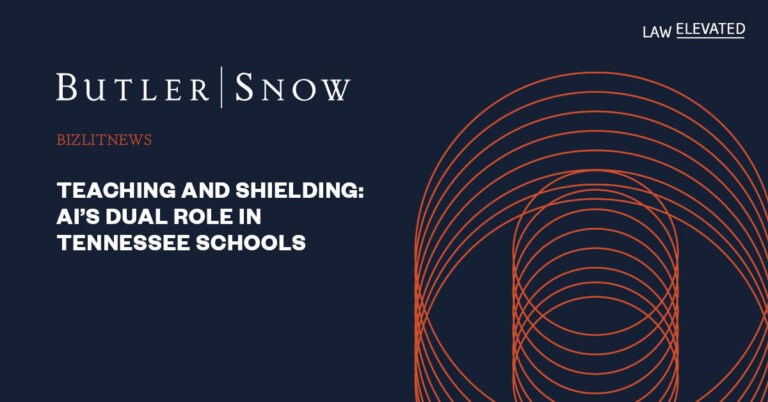Artificial Intelligence (AI) is rapidly reshaping public education in Tennessee, presenting both opportunities and legal challenges for local education agencies (LEAs) and charter schools. In 2024, the Tennessee General Assembly required all LEAs and charter schools to adopt policies governing AI use by the 2024–25 school year. A companion 2025 statute directs the Tennessee Department of Education to provide guidance and fund professional development on responsible AI integration.
While these laws provide a framework, they leave unresolved significant legal issues regarding student privacy, academic integrity, Individuals with Disabilities Education Act (IDEA) obligations, and vendor liability. Counsel must navigate these evolving areas carefully to protect districts from litigation and ensure compliance with state and federal law.
AI tools such as ChatGPT, Grammarly, and auto-completion models can assist students with brainstorming, drafting, or revising work. However, these tools also risk unauthorized substitution of student work, raising plagiarism and academic integrity concerns. Many districts now use AI-detection software, but enforcement is complicated by false positives, contextual nuance, and unequal student access.
For students with disabilities, the legal stakes are higher. AI tools—speech-to-text software, grammar correction, or summarization tools—may be included in an Individualized Education Program (IEP) as assistive accommodations. Districts must distinguish between legitimate support and impermissible ghostwriting. Courts have emphasized that AI cannot replace effective instruction. In the recent case of William A. v. Clarksville-Montgomery County School System, the Sixth Circuit determined that a Tennessee school district’s use of AI supports in place of structured reading instruction for a student with dyslexia infringed upon the student’s right to a Free Appropriate Public Education (FAPE) as mandated by the Individuals with Disabilities Education Act (IDEA).[1] The court was critical of “workarounds” that let the student avoid having to address the root problem (decoding, reading fluency) by substituting AI or software that did the reading/writing tasks for him.[2] Consequently, the court awarded the student 888 hours of compensatory tutoring and attorney’s fees.[3]
AI adoption in schools has also triggered litigation surrounding student surveillance and vendor accountability. Many states including Tennessee have adopted a school zero-tolerance policy for students guilty of certain offenses, and in 2023, Tennessee added “threatening mass violence on school property” to this list. To increase safety and ensure compliance, numerous school districts in Tennessee use AI tools like Gaggle and Lightspeed to monitor student communications for threats of violence or self-harm, but false positives can lead to litigation. In one widely reported 2023 Tennessee case, a 13-year-old middle school student was arrested, placed on house arrest, and eventually sent to alternative school after an AI alert flagged the student’s online comments for potential violence. The comment was later deemed to not be a legitimate threat of harm and her family filed suit alleging constitutional violations. In 2024, Tennessee added a threat assessment requirement to determine validity prior to taking action when such threats are flagged. School districts are urged to ensure their current strategies for detection and assessment of school related violence are robust and comply with current requirements.
Third-party vendor liability is another emerging concern. One recent and high-profile AI-related vendor litigation involves Evolv Technologies. In late 2024, the FTC filed a complaint alleging deceptive marketing surrounding Evolv’s ‘Evolv Express’ weapons detection system through the use of AI.[4] One major concern surrounded Evolv’s claims regarding reliability and false positives. Evolv settled in 2025, agreeing to marketing restrictions and providing a 60-day cancellation window for K–12 customers. Of 65 eligible school districts, 92% remained under contract, and some expanded deployment. Additionally, Evolv has continued to issue new software updates with more robust detection algorithms and functionality.
In Tennessee, Metro Nashville Public Schools (MNPS) serves as a flagship Evolv customer. By 2025, systems were installed in all MNPS high schools, with middle school expansion planned at two schools per week after Fall Break of 2025. Local reporting indicates confiscation of items include vape pens, pepper spray, and lighters—but no confirmed firearms. Several other school districts in Tennessee also maintain contracts with Evolv as another valuable layer of security for their schools.
Meanwhile, the Tennessee Legislature enacted SB 814 / HB 933 in 2025, creating a three-year grant pilot program covering 100% of the costs of new AI weapons detection systems in eligible districts. The proposed legislation defines “eligible LEA,” excluding the Achievement School District, as: having 10 or more schools; identified as priority schools in 2015, 2018, and 2021; among the bottom ten percent of schools, as identified by the Tennessee Department of Education (DOE) in 2017; and that experienced a loss of student life in the 2024-25 school year due to gun violence occurring on the grounds of a school managed and controlled by the LEA’s local board of education. Under the statute:
- Grants are to cover 100 % of costs for new deployments of AI weapons detection in schools lacking such systems.
- The program begins in the 2025–26 school year.
- The DOE is tasked with disbursing funds and prioritizing eligible districts without existing AI detection systems.
The only thing for certain is that policies surrounding AI use by schools will be an ever-shifting landscape. School districts must carefully draft their AI policies to balance innovation and legal risk; preventing plagiarism without undermining accommodations; promoting safety without weaponizing surveillance; and using AI in special education without deflecting the duty to teach.
[1] William A. by & through E.A. v. Clarksville-Montgomery Cnty. Sch. Sys., 127 F.4th 656 (6th Cir. 2025).
[2] Id.
[3] Id.
[4] Fed.Trade Comm’n v. Evolv Techs. Holdings, Inc., No. 1:24-cv-12940 (D. Mass. Filed November 26, 2024).
